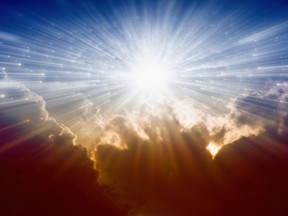Breadcrumb Trail Links
Thomas Jay Oord, a cutting-edge theologian, has nine suggestions on what religion can learn from science
 (Getty Images)
(Getty Images)
Article content
Thomas Jay Oord, a cutting-edge theologian, was recently invited by Ilea Delio, a co-founder of the Center for Christogenesis, to give a paper at the center’s annual online conference on changes religions need to make in an age of science. Many other theologians would agree with his nine suggestions, which I will translate for the average reader.
1. Religion should abandon quests for certainty. Religions should abandon the idea of an inerrant scripture, church, pope or any religious leader or group, claiming that these texts or people have no errors in their proclamations.
Advertisement 2
Article content
Science itself has had no claim to certainty since German physicist Werner Heisenberg introduced his Uncertainty Principle in 1927. It means scientists, in observing things, interfere with what they observe, so they can never know things for certain in themselves.
In Christianity, certainty is tempting as it makes the believer feel secure, but religion is not about security. Jesus demonstrated this in the way he lived, constantly speaking truth to power (the Sanhedrin, lawyers and Pilate). He afflicted the comfortable and comforted the afflicted.
2. Similarly, religion, like science, should avoid seeking absolutes. It should incorporate experiential data as evidence to support or disprove religious beliefs. Due to evolution, science acknowledges no absolutes, only ever-evolving truths. We constantly come to understand things more completely. Experience is the raw data and foundation of any religion. Jesus moved the Jewish faith beyond absolutes like the Ten Commandments to inner experience. In his Beatitudes, attitudes are more important than commands: humility, mercy, purity of heart, longing for justice and peace. The late Pope Francis lived these Beatitudes.
Article content
3. Religions should affirm the deep empirical reality of free will. Our own experience of free will is something we know better than any religious doctrine or scientific theory. Free will is one among many non-negotiables: the reality of an external world, people having values, and a sense of purpose in their lives. Everyone experiences the freedom to make choices for good or evil. Therefore, morality is also non-negotiable. Science cannot reduce everything to materialism, the dominant philosophy of science, which denied freedom, values and purpose. Everyone has values and can directly experience that their life has a purpose, for example, to love and be loved, be a friend, raise good children, find a cure for disease, prevent war, fight climate change, etc.
4. Religions should embrace the idea that God is one cause among other causes. God is not the omnipotent controller of everything because God respects human free will. Thus, reality is an interactive affair between us and God. God intervenes by motivating us from within.
Article content
5. Religion should stop referring to “human nature” as if it is a fixed essence. Humans constantly evolve. The Internet and artificial intelligence are all part of human evolution.
6. Religion should affirm Big Bang cosmology but reject “creatio ex nihilo” (creation from nothing) as there is no Biblical basis for this. “God’s Spirit hovered over the waters” (Genesis 1:2) before God said, “Let there be light.” But science has shown there was, in fact, a beginning.
7. Religions should accept evolution and let go of returning to a pristine past. God is constantly drawing us forward through love, we cannot go back to an imaginary, pristine “Garden of Eden.”
8. Religions should affirm that all complex creatures love, have intrinsic value and are “made in the image of God.” Every mother creature takes care of her brood, and dogs love their masters. Humans are not the only ones capable of love. Every creature, as St. Augustine said, is “both an image of God and not an image of God.” If all creatures are intrinsically valuable, this will dramatically affect our response to the climate crisis.
Article content
9. Religions (and science) should be open to the existence of mind in all creatures. Science has taught us trees communicate with each other through the soil, and whales connect through underwater sounds. All creation has deep intelligence. Science ought to embrace “panpsychism” (mind everywhere), and religion ought to embrace that God has mental and material dimensions.
All this may seem mind-boggling, but it is the direction science and religion are moving towards as they work together and learn from each other.
Bruce Tallman is a spiritual director and educator of adults in religion. brucetallman.com
Article content
Share this article in your social network